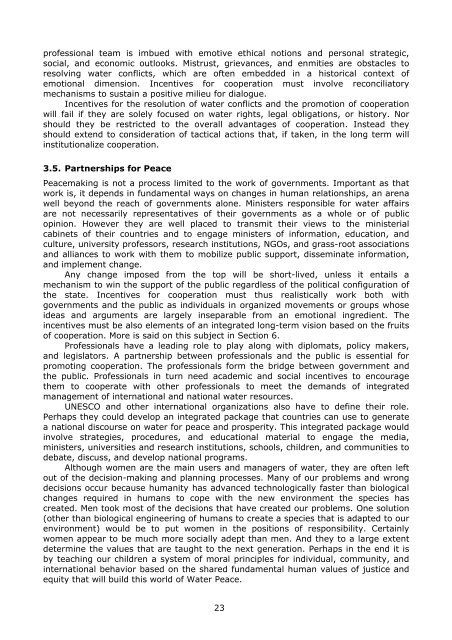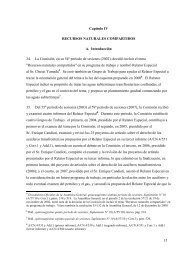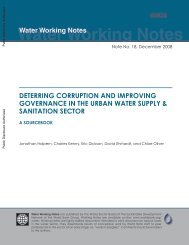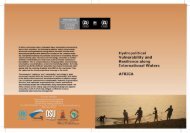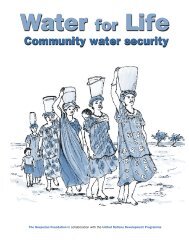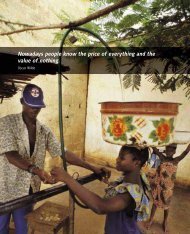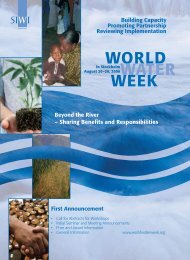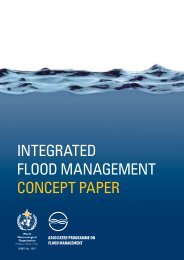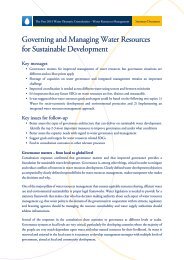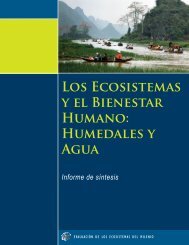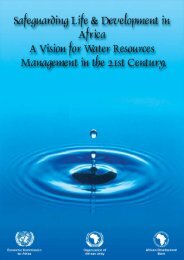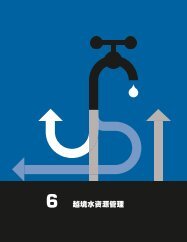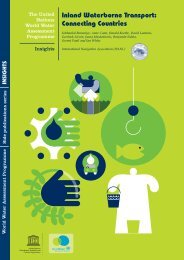Water security and peace: a synthesis of studies ... - unesdoc - Unesco
Water security and peace: a synthesis of studies ... - unesdoc - Unesco
Water security and peace: a synthesis of studies ... - unesdoc - Unesco
You also want an ePaper? Increase the reach of your titles
YUMPU automatically turns print PDFs into web optimized ePapers that Google loves.
pr<strong>of</strong>essional team is imbued with emotive ethical notions <strong>and</strong> personal strategic,<br />
social, <strong>and</strong> economic outlooks. Mistrust, grievances, <strong>and</strong> enmities are obstacles to<br />
resolving water conflicts, which are <strong>of</strong>ten embedded in a historical context <strong>of</strong><br />
emotional dimension. Incentives for cooperation must involve reconciliatory<br />
mechanisms to sustain a positive milieu for dialogue.<br />
Incentives for the resolution <strong>of</strong> water conflicts <strong>and</strong> the promotion <strong>of</strong> cooperation<br />
will fail if they are solely focused on water rights, legal obligations, or history. Nor<br />
should they be restricted to the overall advantages <strong>of</strong> cooperation. Instead they<br />
should extend to consideration <strong>of</strong> tactical actions that, if taken, in the long term will<br />
institutionalize cooperation.<br />
3.5. Partnerships for Peace<br />
Peacemaking is not a process limited to the work <strong>of</strong> governments. Important as that<br />
work is, it depends in fundamental ways on changes in human relationships, an arena<br />
well beyond the reach <strong>of</strong> governments alone. Ministers responsible for water affairs<br />
are not necessarily representatives <strong>of</strong> their governments as a whole or <strong>of</strong> public<br />
opinion. However they are well placed to transmit their views to the ministerial<br />
cabinets <strong>of</strong> their countries <strong>and</strong> to engage ministers <strong>of</strong> information, education, <strong>and</strong><br />
culture, university pr<strong>of</strong>essors, research institutions, NGOs, <strong>and</strong> grass-root associations<br />
<strong>and</strong> alliances to work with them to mobilize public support, disseminate information,<br />
<strong>and</strong> implement change.<br />
Any change imposed from the top will be short-lived, unless it entails a<br />
mechanism to win the support <strong>of</strong> the public regardless <strong>of</strong> the political configuration <strong>of</strong><br />
the state. Incentives for cooperation must thus realistically work both with<br />
governments <strong>and</strong> the public as individuals in organized movements or groups whose<br />
ideas <strong>and</strong> arguments are largely inseparable from an emotional ingredient. The<br />
incentives must be also elements <strong>of</strong> an integrated long-term vision based on the fruits<br />
<strong>of</strong> cooperation. More is said on this subject in Section 6.<br />
Pr<strong>of</strong>essionals have a leading role to play along with diplomats, policy makers,<br />
<strong>and</strong> legislators. A partnership between pr<strong>of</strong>essionals <strong>and</strong> the public is essential for<br />
promoting cooperation. The pr<strong>of</strong>essionals form the bridge between government <strong>and</strong><br />
the public. Pr<strong>of</strong>essionals in turn need academic <strong>and</strong> social incentives to encourage<br />
them to cooperate with other pr<strong>of</strong>essionals to meet the dem<strong>and</strong>s <strong>of</strong> integrated<br />
management <strong>of</strong> international <strong>and</strong> national water resources.<br />
UNESCO <strong>and</strong> other international organizations also have to define their role.<br />
Perhaps they could develop an integrated package that countries can use to generate<br />
a national discourse on water for <strong>peace</strong> <strong>and</strong> prosperity. This integrated package would<br />
involve strategies, procedures, <strong>and</strong> educational material to engage the media,<br />
ministers, universities <strong>and</strong> research institutions, schools, children, <strong>and</strong> communities to<br />
debate, discuss, <strong>and</strong> develop national programs.<br />
Although women are the main users <strong>and</strong> managers <strong>of</strong> water, they are <strong>of</strong>ten left<br />
out <strong>of</strong> the decision-making <strong>and</strong> planning processes. Many <strong>of</strong> our problems <strong>and</strong> wrong<br />
decisions occur because humanity has advanced technologically faster than biological<br />
changes required in humans to cope with the new environment the species has<br />
created. Men took most <strong>of</strong> the decisions that have created our problems. One solution<br />
(other than biological engineering <strong>of</strong> humans to create a species that is adapted to our<br />
environment) would be to put women in the positions <strong>of</strong> responsibility. Certainly<br />
women appear to be much more socially adept than men. And they to a large extent<br />
determine the values that are taught to the next generation. Perhaps in the end it is<br />
by teaching our children a system <strong>of</strong> moral principles for individual, community, <strong>and</strong><br />
international behavior based on the shared fundamental human values <strong>of</strong> justice <strong>and</strong><br />
equity that will build this world <strong>of</strong> <strong>Water</strong> Peace.<br />
23


